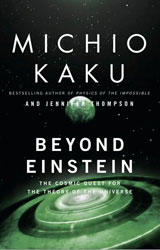Surprising Science
All Stories
Scientists are working to rule out non-biological explanations for conditions present on Titan, a moon of Saturn, that suggest there could be life on the moon’s surface.
My book “Beyond Einstein” takes readers on an exciting excursion into discoveries that have led scientists to the brightest new prospect in theoretical physics today–superstring theory. Simply answer the statement below […]
More doctors are giving consultations online as technology enables convenient patient-doctor exchanges on minor medical issues; the trend is saving everyone time and money.
What are natural laws? How do scientists test them? Is time illusory or real? Do black holes make the universe expand? These questions were posed at a recent workshop for philosophers and physicists.
Examining the brains of deceased alcoholics who smoked, researchers found drinkers who also smoked derived more pleasure from each activity individually, making both harder to quit.
Childbirth may be the miracle of life, but its practical reality is grounded in a set of rather utilitarian necessities that ensure the mother and baby’s health and survival. While […]
“Jewish populations around the world share more than traditions and laws—they also have a common genetic background,” says the New Scientist about a study performed at NYU.
The federal government is enlisting private companies like Pfizer to promote HIV/AIDS prevention programs in high-risk areas following a lull of such programs during Bush’s ‘abstinence-only’ years.
Right now our most advanced robots are not quite as smart as we would want them to be. One of the most popular—Honda’s humanoid robot, Asimo—is quite sophisticated but you won’t […]
Nobel Laureate Bill Phillips stopped by Big Think today to talk about his work in laser cooling, which won him the Nobel Prize in 1997 and is the reason that […]
Michael J. Formica says taking personal responsibility is essential in overcoming addiction but systems like AA allow its abdication.
Astronomer Jill Tarter, director of the SETI Institute, stopped by Big Think today to talk about the question she’s spent her career trying to answer: Is there intelligent life on […]
Labs in England are developing machines that can essentially replicate themselves by building their own spare parts as an insurance against future mishaps, reports the New Scientist.
“For the first time, physicists have confirmed that certain subatomic particles have mass,” writes the L.A. Times. The mass could account for the mysterious existence of dark matter.
“Do people really die of broken hearts?” asks the Times’ health blog. Elevated stress hormones following an emotionally trying event may cause cardiomyopathy, a.k.a. broken heart syndrome.
“Remarkable claims require remarkable proof.” — Carl Sagan The “multiverse” idea—once thought to be so crazy it only belonged on late night television—has now become the dominant theory in all of […]
While artificial intelligence has yet to realize its often dramatic promises, the development of brain science has led thinkers to prioritize the mind over the body as the center of the self.
As diagnosis of mental illness has changed with shifting cultural attitudes, now the term “nervous breakdown” is being reevaluated. Are you on the verge of “burnout syndrome”?
For me going to the mall is like traveling to a foreign country. But somehow I found myself in the Apple store on Saturday, playing with the IPad, the latest […]
An Amazon product review with ellipsis … like this … and a lot of extra punctuation??!? That is, like, so likely to be sincere. I totally mean that, except that […]
Only recently has vegetarianism become a diet that could survive natural selection, so could it be that vegetarians are smarter than the rest of us? Surprisingly strong evidence says yes.
“Can aquatic snails better remember lessons learned when they are hopped up on methamphetamine?” Scientific American says the answer could give insight into the nature of addiction.
“The things patients complain about, like excessive noise, may be more than a nuisance. They may actually be bad for their health,” writes Drake Bennett on noise pollution in hospitals.
If you’re after a good night’s sleep, the belief that exercise helps you rest well is more important than exercise itself, says a new Swiss study published in the U.S.
“Progress without pollution may sound utterly unrealistic, but businesses are putting green chemistry into practice,” by using more ecologically benign chemicals, writes Scientific American.
Many technological hurdles on the road to building household robots have recently been cleared leaving one nagging question in the air—just what do we need them for?
Americans may talk a good game about “work-life balance,” but according to this study, they’re biased against working mothers. More surprisingly, those who liked working moms less also liked the […]
Chinese people are still suffering from the most gruesome biological warfare attacks in modern history. Judith Miller looks at Japan’s “forgotten” biological crimes against China.
Are non-verbal behaviours reliable in the detection of people with mal-intent? Sharon Weinberger says researchers are increasingly dubious of passenger screening programs.
Instruction often assumes that students build knowledge sequentially, but what if it’s much more haphazard than that? Science Magazine explains how video helps convey difficult ideas.








